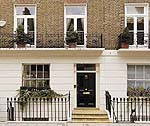Time to buy the freehold
The complex issues of freehold and leasehold negotiations are now affecting buyers and sellers at the lower end of the residential market. Here are some top tips


Many Victorian terrace properties which were converted into flats during the 1980s property boom and given 99 year leases are facing the dilemma of leases shorter than 80 years.
'Up to 40% of the properties we have for sale under £500,000 have a lease shorter than 80 years,' says Mark Hutton, Manager of Douglas & Gordon's Battersea Park office.
'The problem is most mortgage companies won't lend on a property with a lease less than 80 years, especially if you're a first time buyer. In a difficult market you don't want to give buyers any reason to negotiate on price. This leaves vendors with the difficult decision of whether to extend the lease or acquire the freehold to maximise the value of their property before selling.'
Charlie Coombs of Douglas & Gordon's Professional Valuation team adds: 'Owners of Victorian conversion properties with a shortening lease have never been in a better position to acquire the freehold of their building. The freeholder is legally obliged to consider an offer from the collective leaseholders and there is no reason why an agreement on a premium should not be reached. Despite the somewhat lengthy process (anything between six months to a year), 95% of the cases we handle are successful in reaching an amicable conclusion.'
The most significant advantage of acquiring the freehold of a building (over an individual leasehold extension) is splitting the associated costs with other leaseholders. By owning the freehold, residents obtain complete control of the building from management and maintenance to ground rent and future lease extensions. However, one must be aware of the responsibilities that come with it. In most cases it's advisable to appoint a management agent to take care of director's responsibilities such as authorising service charge expenditure, health and safety issues and building insurance.
'There are a few cases where the landlord may demand an unreasonably high premium which could result in the case being handed over to the Leasehold Valuation Tribunal. However, this is the last resort and should only be considered if the difference between the leaseholder's offer and freeholder's demand is large enough to justify the tribunal costs. Small freeholders are less inclined to incur these costs than landlords of large estates,' continues Mr Coombs.
Andrew Lyndon-Skeggs of ELS (Enfranchisement & Leasehold Solutions Ltd) adds: 'What many people don't realise is that the cost of acquiring share of freehold is very similar to the cost of a 90 year lease extension, whereas share of freehold adds more value, is ultimately more acceptable to the market, and confers management control with potential for bringing down costs. Unlike lease extension it is not necessary to have owned the property for two years. Anyone with an unexpired term nearing 80 years should, as a matter of absolute urgency, act now since the cost will jump dramatically from one day to the next as the unexpired lease term drops below 80 years.'
Exquisite houses, the beauty of Nature, and how to get the most from your life, straight to your inbox.
The following scenario illustrates how the cost of buying a share of freehold is very similar to the cost of a lease extension:
A Victorian conversion property in Battersea with a freehold value of £400,000 and a fixed ground rent of £50 per annum with £75 years remaining on the lease. The premium payable for share of freehold would be £21,500 while a 90-year extension would cost £19,400.
'The cost of purchasing the freehold relates in part to the market Value of the property. As the market is now beginning to move upwards again, and bearing in mind that even in a flat market the cost of enfranchising increases as the unexpired lease term reduces, there is real merit in taking advantage of this window of opportunity,' says Mr Lyndon-Skeggs.
Top tips on how to acquire a freehold
1. Appoint an independent adviser to manage the process- for larger blocks
'Applications for Victorian conversions with two or three flats can sometimes be handled by the lessees, with back up from surveyors and solicitors. However, collective enfranchisement for larger blocks is a much more complicated process: the law is specialised, the valuations can be complex and, in the case of Collective Enfranchisement, the human element is crucial. Therefore, particularly for medium and larger sized Collective Enfranchisements, use a firm that provides a comprehensive service, from start to finish,' says Mr Lyndon-Skeggs.
2. Establish the Fee from the outset
'The price payable for your share can be estimated from the outset, but cannot be determined precisely until later in the process. However, there are a few specialists who will be prepared to fix their fees at the start of the project to cover the entirety of the normal enfranchisement process. This avoids the shock of unexpectedly high fees later, particularly where fees are being charged on an hourly basis, it may not be you who is escalating the fee, but rather your neighbour who is on the phone to the solicitors 24 hours a day,'
3. Secure the participancy and establish the ground rules
'It is essential to establish participancy at the outset and then encapsulating this into a robust Participation Agreement that will bind the parties, and set out the ground rules for the project, in order to avoid problems at a later date.'
The process
Call a meeting with the other residents to determine if they are interested. Set a deadline for their decision otherwise they will delay the process Get fee quotes from a selection of valuers and solicitors and appoint those who present the most attractive offer The cost of the freehold for each property is determined by the value of the property, remaining length of the lease and ground rent All parties agree on the costs and agree to proceed A statutory notice is served on the freeholder with the offer from the collective leaseholders The freeholder serves a counter notice after conducting an independent survey and negotiations begin
Extra fees:
Lessee Fees : These will include surveyor valuation fees; surveyor negotiation fees; legal fees associated with the Participation Agreement, Initial Notice, Report on Title, landlord's Counter Notice, conveyance of the freehold, preparation and issue of the new leases and share certificates; establishment of the Nominee Purchaser Company; provision of company secretary; specialist advice on non participant finance; project manager etc. If you appoint a comprehensive service provider, all of these should be within the single fee, but this should be checked.
Reimbursement of landlord fees: A landlord is entitled to recover his valuation and legal costs, but not his costs associated with the negotiations. The amount of work undertaken by a landlord is substantially less than that undertaken by the lessee consultants and, consequently, the landlord costs should be approximately one third of the lessee fees. Lessees do not have to reimburse landlord costs where the enfranchisement is being conducted under the 1987 Act, pursuant to Section 5 Notices, triggered as the result of a landlord potentially selling to a third party.
Stamp Duty : As a land transaction, stamp duty is payable. However, for enfranchisement this has been greatly helped by the last budget. Previously, the rate at which stamp duty was payable (0-4%) was fixed by the total cost of the enfranchisement. Now, since the last budget, the total cost is divided by the total number of flats and it is this lower figure that determines the percentage. As a result, for many enfranchisements stamp duty will now be at 0 or 1%.

